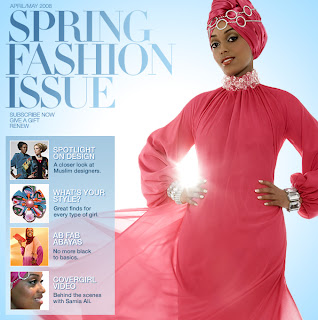Muslim Girl magazine has been out for about a year and half and has been profiled previously on MMW. On Monday, CBC radio show, Sounds Like Canada, interviewed Ausma Khan, founder and editor-in-chief of Muslim Girl. Interviewed by host Amanda Putz, Khan talked about the magazine as well as herself and her own experiences.
Putz tells us that Khan (pictured here), as a Muslim woman in the media, is often referred to and consulted for issues regarding Muslims. For example, Khan’s comments on the Aqsa Parvez murder are mentioned. In the controversy surrounding the hijab following the murder, Muslim Girl magazine then spoke with young Muslim girls about their views on the murder as well as the hijab.
When questioned about the conflict regarding the hijab, Khan diplomatically states that it’s not a conflict but rather a matter of choice. The hijab for Muslim Girl is a non-issue, as it should it be, and both those with and without hijab are included as Khan says the aim of her magazine is to represent all Muslim girls in North America.
Putz asks Khan whether she grew up not wearing the hijab. Khan, who does not nor ever did wear the hijab, states her Pakistani heritage, in which the hijab is not common, is part of the reason she did not wear it. She also explains that her hijab-less mother, who she describes as an outspoken feminist, does not believe the hijab is obligatory. The connection is curious: either she may be saying that not believing in it requires one to be an outspoken feminist, or that believing in it requires one not be. But then Khan, almost as if to explain herself, states that although wearing the hijab is not common in the culture in which she grew up, she still comes from a “pious and practicing Muslim family.” I was unclear as to why she felt the need to include that comment. It seemed as if she was stating that despite not believing in an obligation of the hijab her family was still pious – as if that is not common. Was Khan buying into the common belief that hijab equals piety?
Amongst talk of fashion and style in Muslim Girl, the interview takes an interesting twist, one which our Canadian readers will find especially interesting. Khan compares her experiences of being Muslim in the US and Canada. Khan, a Canadian Muslim now living in the U.S. and originally from my own birth town (Prince Albert, Saskatchewan), explained how as a Muslim in Canada, she was very complacent. She felt accommodated and respected. Even when reporters in Canada would ask her questions, for instance on the Aqsa Parvez case, their questions were always respectful. Her experiences were not similar in the U.S. Although she met people who were supportive and willing to learn, she states that the media in the U.S. has been quite negative about Muslims. This conversation reveals one of the many differences between the cultures of the U.S. and Canada. Perhaps this is speaking to the differences between the Muslims of Canada and the U.S., and the importance to recognize the differences in our experiences.
 When explaining her motivation for Muslim Girl magazine, Khan cites her own feelings of not belonging. After attending the University of Toronto and being a member of their diverse and accepting Muslim Student Association, she tells the listeners of her very different experiences with the University of Ottawa’s MSA, a very conservative group whose interpretations of Islam were different than her own, and within which she did not feel welcome. Especially since their interpretations encouraged strict segregation of the sexes and placed women in an inferior position, assuming a deficiency of knowledge. This is something with which many Muslim girls will be able to identify. Khan stating it made it seem acceptable to admit the sexism is present in many interpretations of Islam. After all, it does happen and so many women are being alienated from Islam as a result. And perhaps, in a Canadian context, especially on CBC radio, the listenership of which tends to be liberal, this statement felt safe to make. No cringing necessary.
When explaining her motivation for Muslim Girl magazine, Khan cites her own feelings of not belonging. After attending the University of Toronto and being a member of their diverse and accepting Muslim Student Association, she tells the listeners of her very different experiences with the University of Ottawa’s MSA, a very conservative group whose interpretations of Islam were different than her own, and within which she did not feel welcome. Especially since their interpretations encouraged strict segregation of the sexes and placed women in an inferior position, assuming a deficiency of knowledge. This is something with which many Muslim girls will be able to identify. Khan stating it made it seem acceptable to admit the sexism is present in many interpretations of Islam. After all, it does happen and so many women are being alienated from Islam as a result. And perhaps, in a Canadian context, especially on CBC radio, the listenership of which tends to be liberal, this statement felt safe to make. No cringing necessary.
For Khan, Muslim Girl magazine is a means of education and enlightenment for both Muslim girls and non. Her role as editor-in-chief has been utilized by various organizations to educate non-Muslims about Muslims, especially Muslim women. The magazine itself is more likely to be picked up by Muslim girls and/or women. Non-Muslims perhaps are not going to learn much directly from the magazine, as it’s content is relevant mainly to Muslim girls. But at least Khan, with her magazine, has been able to create a space for Muslim girls of varying kinds.
To hear the interview visit The Best of Sounds Like Canada podcast site and scroll to June 2.
